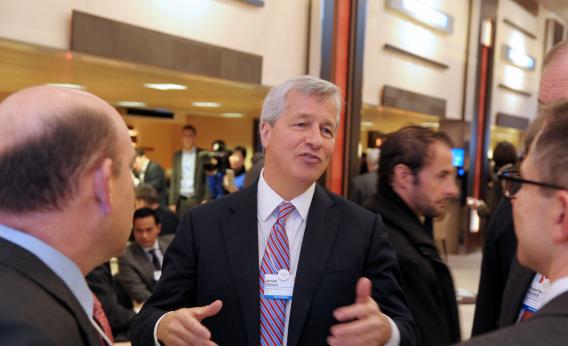A couple of people asked me to say more about my remarks yesterday on banks doing share buybacks and raising dividends. Let me just start by saying that Anat Admati and Martin Hellweg’s book really crystallized my thinking on this, and you should read it and my review. But they reason largely from first principles back down. Two items in the news today—Senate hearings about JPMorgan’s busted “London Whale” trade and the Fed giving a greenlight to shareholder payouts are a good alternate way of illustrating the issue.
The question is: Why are we having hearings about JPMorgan losing a bunch of money? After all, companies lose money all the time. It’s true that it’s rare for companies to specifically lose money on complicated dividend transactions. But what companies generally do is take money and invest it in things. Those things are often very complicated. United has invested a lot of money in 787 airplanes, for example, and 787 airplanes are certainly complicated. I bet the factories where Boeing makes the 787s are even more complicated. And as we’ve seen with the battery fire problems, those complicated investments in physical goods can certainly go awry. But normally while we consider airplane safety to be a public policy problem, the question of whether or not United is making financially sound investments is considered United’s business, not the U.S. Senate’s.
So why is that?
The basic reason is that when a company makes enough bad investments, it may go bankrupt. When it goes bankrupt, the people to whom it owes money lose out. But when a bank goes bankrupt, that generally isn’t what happens. The bank’s creditors still get paid. And not just banks that are “too big to fail” either. If you’re a depositor at Mom & Pop Local Bank, then that means you’ve loaned money to Mom & Pop Local Bank. The role of the FDIC is to ensure that even if Mom & Pop totally screw up and the bank fails, that you still get paid 100 percent of the money you’re owed. “Too big to fail” considerations further complicate the picture, but the point is that people who are owed money by banks get paid no matter how badly the bank screws up. An airline is different. If United wants to borrow some money, you have to wonder if they’re going to go bankrupt and end up stiffing you. So the deeper into debt that United goes, the more likely United is to go bankrupt. That tends to limit how indebted United can become. It can finance some of its investments with borrowed money, but it also needs to finance a lot of investments by earning profits and then recycling the profits into new investments.
JPMorgan isn’t like United. Whatever happens to JPMorgan, if JPMorgan owes you money you’re going to get paid. So JPMorgan can go very deeply into debt. This is why the Senate cares about whether or not JPMorgan’s investments go badly. Whatever happens to JPMorgan, if JPMorgan owes you money you’re going to get paid, and the government may well end up directly or indirectly needing to pay you. So regulators are supposed to prevent you from taking unwise risks.
But my point—following Admati and Hellweg—is that regulators shouldn’t just look over JPMorgan’s shoulders and second-guess its investment decisions. Regulators shouldn’t let JPMorgan go so deeply into debt. Or, rather, given that JPMorgan is already deep in debt. they should make it get out of debt. Which shouldn’t be difficult. JPMorgan is profitable. Those profits can be used to pay dividends to JPMorgan shareholders. But they could also be used to reduce JPMorgan’s level of indebtedness. Then JPMorgan managers would be playing less with creditors’ money and more with shareholders’ money. That would make it much less likely that any given bad trade would lead to a bankruptcy scenario. It would let us worry less about second-guessing JPMorgan’s trades and just be more confident that whether or not they screw up, the financial system can stay strong and steady. And contrary to banker myth, blocking banks from becoming so indebted wouldn’t reduce their ability to lend—it would reduce their ability to return profits to shareholders.
